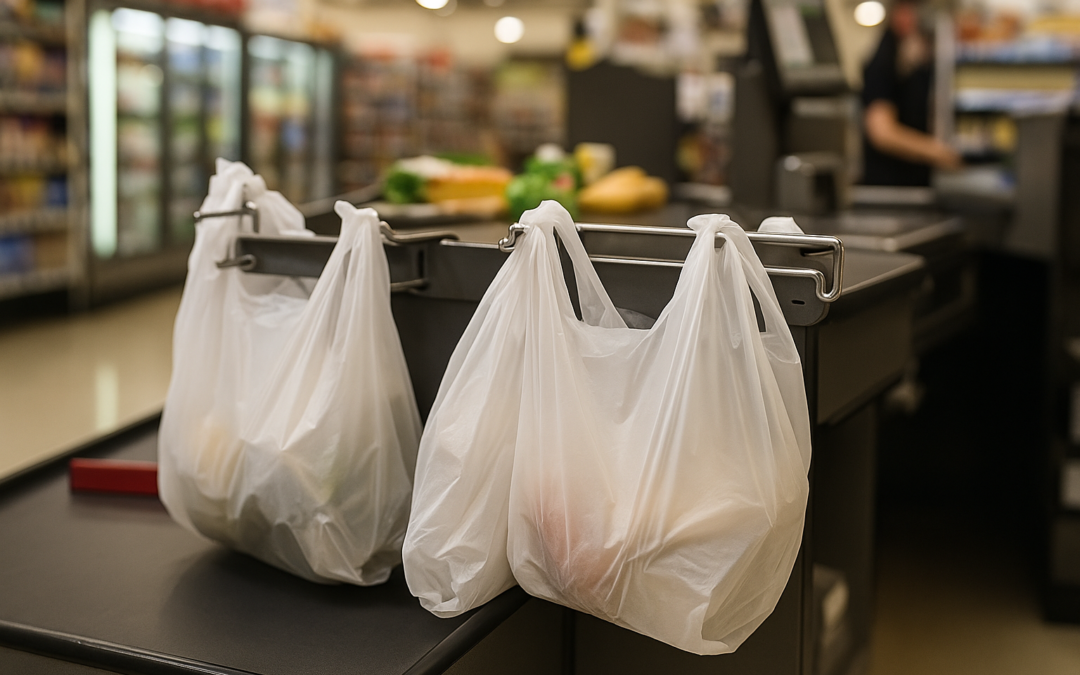Across the U.S., efforts to reduce plastic waste continue to gain traction, especially regarding single-use plastic grocery bags. Over the past decade, a growing number of states and cities have adopted legislation restricting or banning these types of bags altogether.
One key detail often gets overlooked amid the headlines: these bans target disposable grocery and retail bags—not custom-manufactured poly bags like those produced by A-Pac.
That distinction matters. At A-Pac, we understand that packaging laws can be confusing. Our goal with this article is simple: to clarify the current state of plastic bag legislation across the country, provide accurate context, and reassure our customers that our products remain unaffected.
If you’ve been wondering which states currently ban plastic bags—or what that means for your business—you’re in the right place.
Why Plastic Bag Bans Are Making Headlines Again
Plastic bag bans aren’t new, but they continue to make waves. From legislative debates to viral social media discussions, these policies remain a hot topic nationwide.
But the attention can also lead to confusion. Not all plastic bags are the same, and most laws clarify that distinction—but that nuance doesn’t always make it into the headlines. Most state and local bans specifically target single-use plastic bags used at grocery stores, convenience stores, or retail counters. These are typically lightweight, disposable bags designed for short-term use.
A-Pac’s custom-manufactured poly bags are a different category entirely. Designed for durability, performance, and industrial applications, our bags serve businesses in manufacturing, food packaging, healthcare, and more. They are not subject to the same restrictions and are not impacted by the single-use plastic grocery bag bans currently in place.
What States Ban Plastic Grocery Bags (As of 2025)
As of mid-2025, twelve U.S. states have enacted statewide bans on single-use plastic grocery bags. These laws primarily target lightweight plastic bags provided at checkout in grocery stores and retail establishments. I
Here’s an overview of the states with active bans:
1. California
- Ban Enacted: 2016
- Details: Prohibits single-use plastic bags at large retailers; mandates a minimum 10¢ charge for recycled paper or reusable bags. Starting January 1, 2026, all plastic shopping bags will be banned statewide, including thicker plastic bags previously considered reusable.
2. New York
- Ban Enacted: 2020
- Details: Most retail outlets ban single-use plastic bags. Counties can impose a 5¢ fee on paper bags.
3. Hawaii
- Ban Enacted: De facto statewide ban
- Details: All counties have implemented bans on plastic checkout bags, effectively creating a statewide prohibition.
4. Oregon
- Ban Enacted: 2020
- Details: The law prohibits single-use plastic checkout bags and requires retailers to charge a minimum 5¢ fee for paper or reusable bags.
5. Maine
- Ban Enacted: 2021
- Details: It bans single-use plastic carry-out bags and mandates a minimum 5¢ fee on recycled paper or reusable plastic bags.
6. Vermont
- Ban Enacted: 2020
- Details: It prohibits single-use plastic carry-out bags and restricts single-use straws and polystyrene containers.
7. Connecticut
- Ban Enacted: 2021
- Details: Imposes a ban on single-use plastic bags; retailers must charge a fee for alternative bags.
8. New Jersey
- Ban Enacted: 2022
- Details: Implements one of the strictest bans, prohibiting single-use plastic and paper bags at large grocery stores.
9. Colorado
- Ban Enacted: 2024
- Details: Bans single-use plastic bags at large retailers; requires a 10¢ fee for paper or reusable bags.
10. Delaware
- Ban Enacted: 2021
- Details: Prohibits single-use plastic bags at large retailers; mandates a 10¢ fee for paper or reusable bags.
11. Rhode Island
- Ban Enacted: 2024
- Details: Bans single-use plastic bags at retail establishments; encourages the use of reusable bags.
12. Washington
- Ban Enacted: 2021
- Details: Prohibits single-use plastic carry-out bags; requires an 8¢ fee for compliant paper or reusable plastic bags.
Upcoming Legislation:
- Pennsylvania: Legislation has been proposed to implement a statewide ban on single-use plastic bags, potentially making it the 13th state to do so. Philadelphia has already reported a significant reduction in plastic bag usage since its local ban began in 2018.
What It Means for A-Pac Customers
It’s important to note that while these bans focus on single-use plastic grocery bags, A-Pac’s custom-manufactured poly bags, designed for industrial and commercial applications, are not affected by these regulations.
Our bags are engineered for specific applications across industries like manufacturing, food packaging, healthcare, and agriculture. Whether you’re using gusseted liners for pallet loads or custom poly film for automated packaging systems, A-Pac products are built for functionality, compliance, and long-term performance, not for single-use consumer transactions.
We remain committed to clarity, transparency, and providing you with the products—and peace of mind—you need to keep business moving forward.
Looking for the Right Bag For Your Business—Without the Red Tape?
State-level bans may be tightening around grocery store plastics, but A-Pac bags aren’t part of that conversation. Our poly bags are custom-built for real-world performance, not disposable retail use.
If you need durable, compliant packaging you can count on, we’ve got you covered.
Let’s talk. Our team is here to help you find the right solution for your operation.
